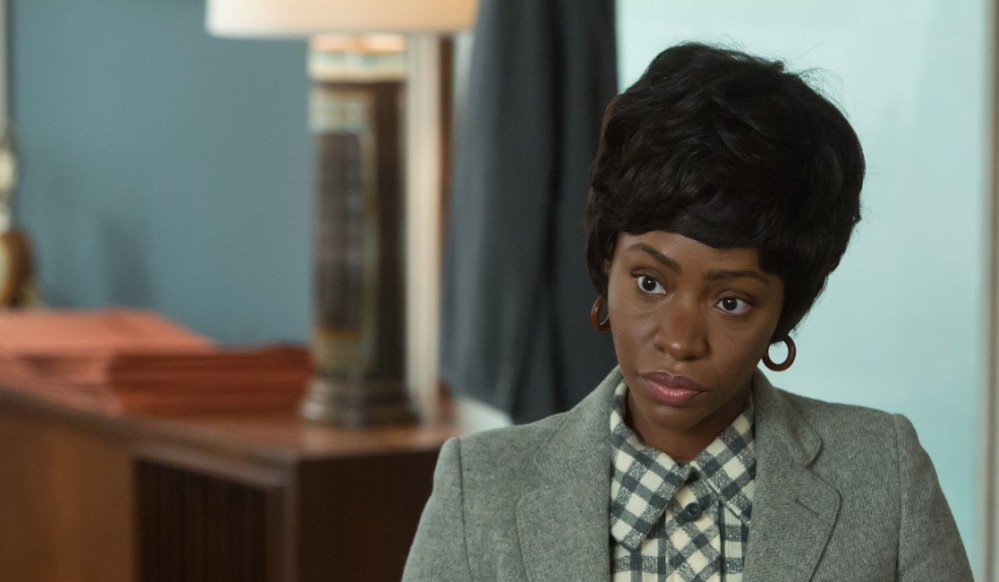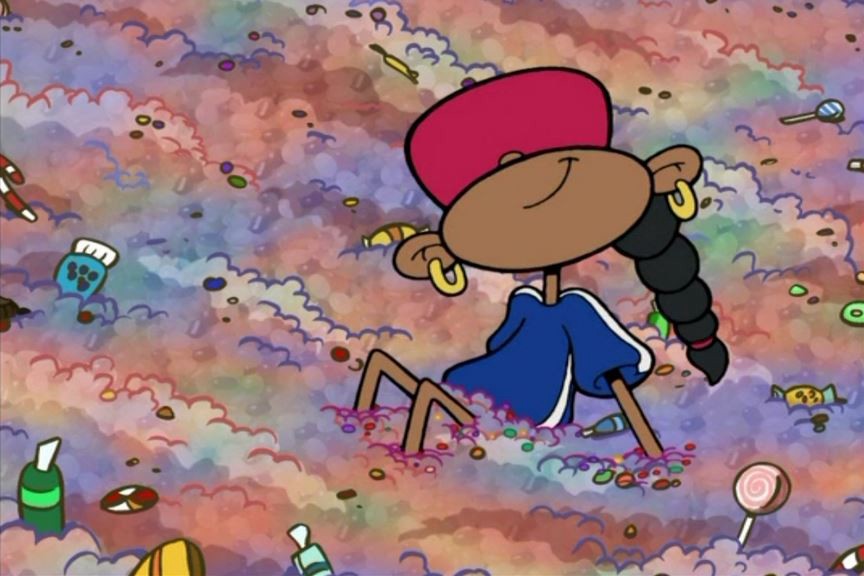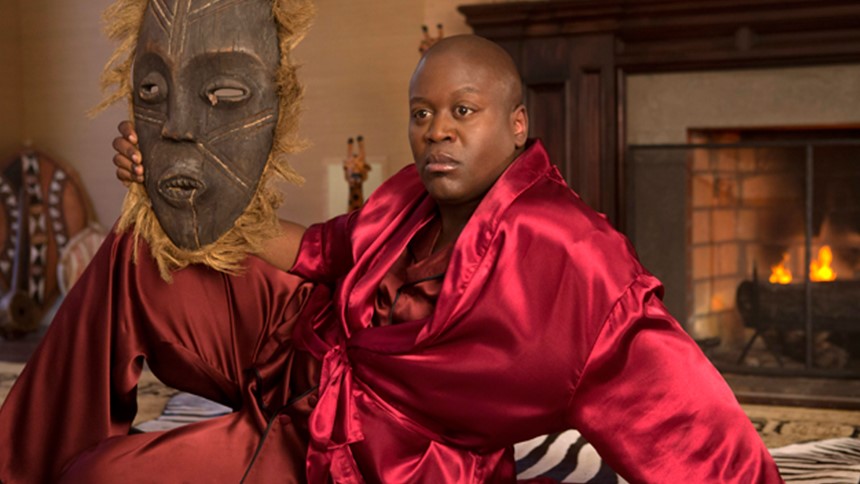Persons of the periphery. A rare glimpse at best. The complexities of these character’s lives are seldom explored, many of which, if given the opportunity, have enough depth to develop into a spin-off series of their own. The semantics of which, I will try to avoid for the sake of going on my own fanatical tangent. Lets explore what we do know first, in this list, there is an emphasis on so called ‘minorities’, whatever that means.
Dawn Chambers, Mad Men

Introduced late into the pastiche historical whirlwind that is Mad Men, Dawn Chambers’ presence served as a mark of progress and spectacle. She became the first African- American employee at the coveted Sterling Cooper Draper Price, a testament to the socio-political tensions that ran deeply through the 60s. Mad Men, a show that is relentless in its honest depiction of those times, is all too aware of the harsh realities that black people, especially women face in the workforce, and so Dawn Chambers differs slightly than the rest of the list as a character’s status as a neglected gem is wholly intentional.
Mad Men is without a doubt a feminist television show, and so it breaks away from the punishing attitudes we would expect from white men and woman from the 60s, giving Dawn Chambers a steady, yet remarkable rise in power, starting off her debut as a joke of an employee, and ending with the position of personnel manager- a constrained fairy tale ending, yet of so satisfying. However, the show does not grant us much access to Dawn outside of the office, in which her paranoia and fear of being fired for some irrational reason subsides. The few outdoor interactions we do get are brief, yet telling. When a second black woman, Shirley, gets hired to the agency, they share their collective experiences through quick and intelligent sarcasm, such as the iconic exchange when they see each other in the staff kitchen- Dawn jokes “Morning Dawn” to which Shirley cleverly retorts “Morning Shirley”. From this seemingly irrelevant exchange we get a strong sense of precisely how it feels to be black women working in a white world.
Dawn’s lack of exploration is an intra-series tragedy, as viewers we know precisely why she isn’t given the filling out she deserves. Ambitious, quick-thinking, longing for love- Dawn’s character had all the ingredients to be a truly iconic character in an already massively iconic series.
Numbah 5, Codename: Kids Next Door

Absolutely should have been the main character. C’mon now, she was the coolest. The show did a good job of balancing out its five protagonists, each were given some form of depth as the series progressed. However, and this is simply me overanalysing a cancelled child’s cartoon, I can’t help but find the backstory given to Numbah 5 especially peculiar. For context, her older sister Cree (AKA Numbah 11), a skilled assassin, defects from the KND, betraying the very establishment her sister is a part of. Numbah 5’s usual level-headed attitude is lost in the face of her sister. What does this have to do with anything you ask?
There is a certain weight that comes with being a black woman, I for one can only speak from observations and experience being a man myself. What I realised with Numbah 5 is her ability to stay cool is one mark away from being almost motherly towards the rest of the group, a stereotype that has been seen time and time again. In a sense Numbah 5 circumvents that, when her sister, who has no form of compassion or understanding for her sibling shows up. It allows young children, young black girls, to see a character who can be vulnerable, a character that is allowed to make mistakes and learn, much like Numbah 5 begins to do as she learns her sister is beyond saving.
Numbah 5’s growth and humanity is what makes her a valuable asset to children’s television, far too often children, especially young girls see one-dimensional generic archetypes take up most their screen, creating a complex that can be a detriment later on in life. It is important that a show, which focuses on the lives of various Kids, to showcase characters that children are able to relate to, Numbah 5 and all her quirks and imperfections, her cute crush on Numbah 2 and her readiness to be both strong and understanding make her my favourite addition to this rather short list. Once again if I haven’t hinted it enough, she should have been the main character (not sorry Numbah 1).
Titus Andromedon, Unbreakable Kimmy Schmidt

UNDOUBTABLY THE MAIN CHARACTER, FIGHT ME. Apologies. What a blessing it is to have a character like Titus Andromedon during this golden era of television. You read that correctly, the man’s name is TITUS ANDROMEDON. An American hero, a tragic mess and the final third of this think piece. In all seriousness, Titus’ presence is a rare enough sight to make me lose composure. He brings such vibrancy to a show that relies heavily on the absurdity of its storylines. But we already know this. We love Titus’ sassy remarks and complete lack of care for anything that doesn’t revolve around himself. These are the surface level observations that you could read anywhere. Let’s dig a bit further.
The series introduces Titus during a low point in his life. He’s near enough homeless and has a terrible job, earning very little. His energetic veneer goes as fast it comes when he meets the titular character Kimmy, after discovering her naivety he quickly ushers her to return to wherever she came from, the prospect of trying to survive in New York City is just not a possibility and he is all too familiar with this. Being a black, gay effeminate man is a reality that cuts your opportunity to thrive in half, Titus, a seasoned and talented star, is barely keeping afloat. Yet he remains the heart of the show, Kimmy’s advisory and a coach on the savvy attitude you need to survive in the big apple.
Gay characters, as we all know, have not been represented in the fairest light on television to say the least. Pushed to the background, their storylines and characteristics revolve entirely around their sexualities, which is a big part of who they are, but it should never be limited to that. Titus carries far more depth than what we are used to. The bizarre nature of the show passes off deeply disturbing backstories such as being kidnapped for 15 years or forcing a gay man into a heterosexual marriage as light-hearted, jokey material. Consequently, when the characters, especially Titus, do genuinely get serious, the meaning becomes far more significant and real. A strong example found in the most recent series is Titus’ mature approach to the growing space between him and his boyfriend Mikey, he reflects deeply before deciding that Mikey needs room to grow. An important part of the coming out process is finally letting someone be a part of your romantic life. You so desperately cling to that first person that you become willing to let things slide for the sake of retention. Titus knew this all too well, and so in hilarious Titus fashion, departed from the relationship with a brilliant LEMONADE medley.
In part, this think piece is about characters that need more appreciation, but I hope to have raised some valid points about the importance of making these characters’ complex, allowing them to feel and to break and to build again. For there are people watching with attentive eyes, pleading with the screen to see and understand more, perhaps in hopes to understand themselves.